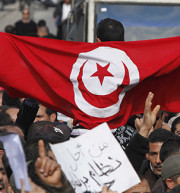
UN Special Rapporteur Maina Kiai has authored a commentary for the International Service for Human Rights, in which he blasts the practice of targeting of groups “most at-risk” who seek to exercise their assembly and association rights. The plight of at-risk groups was the subject of a report Kiai presented to the UN Human Rights Council on June 10, 2014. The label 'most at risk' refers to the heightened occurrence of attacks and reprisals against these groups Kiai notes in article that it is hard to define exactly what “at risk” means. “It’s a moving target,” he writes. “Today it could be an obscure classification, based on religion, ethnicity, disability or sexual orientation. Tomorrow it could be broader – young or old, male or female. The next day it could be you.” “Indeed, somewhat paradoxically, every single person reading this article will have fallen into one of the report’s at-risk groups at some point in their lives,” he adds. Kiai argues that the rationale for targeting marginalized groups invariably comes back to fear. For governments, this can be fear of seeing their authority undermined. But for ordinary people it usually comes down to fear of the unknown. “Unfortunately, many governments are all too happy to leverage this fear for their own... Continue reading →

The Journal of Global Ethics has published an essay by Maina Kiai, in which he reflects on the first three years of his mandate, and the global state of assembly and association rights three years after protests exploded in Tunisia, sparking the Arab Spring. The essay, “Three years after Tunisia: thoughts and perspectives on the rights to freedom of assembly and association from United Nations Special Rapporteur Maina Kiai,” is available for free download to the first 50 people; subsequent access is by purchase only. Although Kiai’s mandate was created in late 2010 against the backdrop of shrinking space for civil society, a massive and growing global protest movement has grabbed most of the headlines since 2011. Kiai argues that the mandate has made a measurable impact – having helped raise awareness of repressive NGO laws, provided technical assistance to governments to strengthen assembly and association rights and developed soft law. But perhaps the most important work of the mandate, he argues, has been its contribution to a better understanding of just how important the rights to freedom of peaceful assembly and association are. “These rights satisfy people’s fundamental desire to take control of their own destinies,” Kiai writes. “They need to speak out, to work together... Continue reading →

An op-ed by Maina Kiai has been featured in the Guardian. The piece concerns the United Kingdom's proposed "Transparency in Lobbying, Non-Party Campaigning, and Trade Union Administration Bill" - legislation that would impose harsh restrictions on civil society advocacy during the year prior to an election. The most concerning part of the legislation would broaden the definition of what constitutes "election campaigning" to include any activity that affects the outcome of an election, even if unintentionally. The law would then regulate that activity as election campaigning and impose severe limits on spending. The concern, many charities say, is that their normal advocacy activities would be labeled "election campaigning" subject to campaign laws, virtually shutting them down during election periods. Although the legislation is being sold as a way to level the electoral playing field, Kiai argues that the bill actually does little more than shrink the space for citizens – particularly those engaged in civil society groups – to express their collective will. Meanwhile, restrictions on in-house corporate lobbyists would be weak, leaving civil society groups to bear the brunt of the law's impact. While it is understandable that the UK might wish to establish restrictions on the influence... Continue reading →

A piece by Maina Kiai has been featured today in the Guardian's Poverty Matters blog. As he prepares to present his latest report -- which is on the freedoms of peaceful assembly and of association in the context of elections -- to the UN General Assembly in New York, Kiai argues that the international community should stop endorsing flawed elections that amount to "civilian coups." He calls upon UN member states to improve their efforts to facilitate and protect assembly and association rights during all phases of elections. Click here for a link to the... Continue reading →